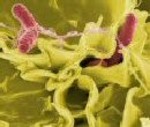
The MiSeq sequencing systems and reagents will help the Food and Drug Administration (FDA) collect data to source tracking Salmonella that may be involved in future produce-related outbreaks, said Illumina.
The company said it’s possible to sequence most bacterial genomes for less than $100 per sample, with its Nextera XT library and the MiSeq system.
The Next Generation Sequencing (NGS) technology can identify foodborne pathogens and combined with the firms Nextera XT sample preparation kit, users can prepare samples in less than 90 minutes with 15 minutes hands on time and whole genomes can be sequenced within a day.
Faster and improved resolution
Susan Knowles, senior market manager, applied markets at Illumina told FoodQualityNews.com that the system can sequence the genome of any strain of any species from all sources and can differentiate closely related strains.
“The basis and value of the technology is to provide accurate subtyping and cluster analysis for investigating food-borne outbreaks and traceback to the food or environmental source.
“Conventional molecular typing tools lack the resolution for differentiating tightly linked bacterial isolates, and provide limited genetic differentiation of certain strains such as Salmonella.
“Faster detection could enable food safety agencies to identify the source of an outbreak more quickly and take corrective action (e.g. product recalls) to contain the spread of a pathogen.”
She added the NGS tool can distinguish bacterial strains that differ by as little as one base pair, which are differences that appear indistinguishable by current methods.
Generate from historical collections
Illumina claim that by using MiSeq, the FDA’s national and state laboratories will be able to generate whole genome sequences from historical pathogen collections and bacteria collected from produce sources across the country.
Sequencing data will be uploaded real-time to the National Center for Biotechnology Information (NCBI) curated database and the data will serve as proof-of-concept for using a whole genome sequencing based approach to pathogen detection, identification and traceback.
Sequencing provides accurate subtyping and cluster analysis for investigating food-borne outbreaks and traceback to the food or environmental source.
However, conventional molecular typing tools lack the resolution for differentiating tightly linked bacterial isolates and provide limited genetic differentiation of certain strains such as Salmonella.
MiSeq is suited for screening bacterial pathogens due to its speed, simple workflow, high resolution, and accuracy, which enhance the ability to identify close related bacterial isolates, said Illumina.





